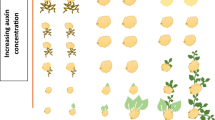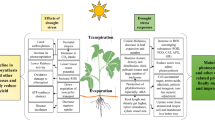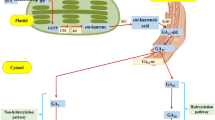Abstract
We established a novel in vitro method, termed the root recovery assay, to evaluate the survival under osmotic stress of lettuce (Lactuca sativa L.) seedlings. Under salinity and drought stress, combination of the root-bending assay and root recovery assay showed the same trends in dry weight and survival rate as a hydroponic culture. Both in vitro assays and hydroponics ranked the three lettuce cultivars in the same order of drought tolerance. The root-bending assay evaluated the plant’s growth and the root recovery assay indicated the plant’s survival. In addition, the combined assay required less space and approximately half the time period compared with the hydroponic culture. These results suggested that application of the root-bending and root recovery assay should be a rapid and space-saving method with which to evaluate the osmotic stress tolerance of lettuce from both growth and survival standpoints.



Similar content being viewed by others
Abbreviations
- cv.:
-
Cultivar
- MS:
-
Murashige and Skoog
- PEG:
-
Polyethylene glycol
References
Ashraf M (1994) Breeding for salinity tolerance in plants. Crit Rev Plant Sci 13:17–42. doi:10.1080/713608051
Flowers TJ, Yeo AR (1989) Effect of salinity on plant growth and crop yields. In: Cherry JH (ed) Environmental stress in plants. Springer-Verlag, Berlin, pp 101–119
Howden R, Cobbett CS (1992) Cadmium-sensitive mutants of Arabidopsis thaliana. Plant Physiol 99:100–107
Iuchi S, Koyama H, Iuchi A et al (2007) Zinc finger protein STOP1 is critical for proton tolerance in Arabidopsis and coregulates a key gene in aluminum tolerance. Proc Natl Acad Sci USA 104:9900–9905. doi:10.1073/pnas.0700117104
Liu Q, Kasuga M, Sakuma Y et al (1998) Two transcription factors, DREB1 and DREB2, with an EREBP/AP2 DNA binding domain, separate two cellular signal transduction pathways in drought- and low-temperature-responsive gene expression, respectively, in Arabidopsis. Plant Cell 10:1391–1406
Murashige T, Skoog F (1962) A revised medium for rapid growth and bioassays with tobacco tissue cultures. Physiol Plant 15:473–497. doi:10.1111/j.1399-3054.1962.tb08052.x
Neumann PM (1995) Inhibition of root growth by salinity stress: toxicity or an adaptive biophysical response? In: Baluska F, Ciamporová M, Gasparíková O, Barlow PW (eds) Structure and function of roots. Developments in plant and soil sciences. Kluwer Academic Publishers, Dordrecht, Netherlands, pp 299–304
Orcutt DM, Nilsen ET (2000) Soil process and plant stress physiology. In: Orcutt DM, Nilsen ET (eds) Physiology of plants under stress: soil and biotic factors. Wiley, New York, pp 177–235
Sambatti BM, Caylor KK (2007) When is breeding for drought tolerance optimal if drought is random? New Phytol 175:70–80. doi:10.1111/j.1469-8137.2007.02067.x
Wu SJ, Ding L, Zhu JK (1996) SOS1, a genetic locus essential for salt tolerance and potassium acquisition. Plant Cell 8:617–627
Zhu JK (2001) Plant salt tolerance. Trends Plant Sci 6:66–71. doi:10.1016/S1360-1385(00)01838-0
Acknowledgement
This work was supported in part by a grant from the Salt Science Research Foundation No. 0513.
Author information
Authors and Affiliations
Corresponding author
Additional information
Hideki Maruyama and Ryohei Koyama contributed equally to this work.
Rights and permissions
About this article
Cite this article
Maruyama, H., Koyama, R., Oi, T. et al. In vitro evaluation of osmotic stress tolerance using a novel root recovery assay. Plant Cell Tiss Organ Cult 95, 101–106 (2008). https://doi.org/10.1007/s11240-008-9420-y
Received:
Accepted:
Published:
Issue Date:
DOI: https://doi.org/10.1007/s11240-008-9420-y




